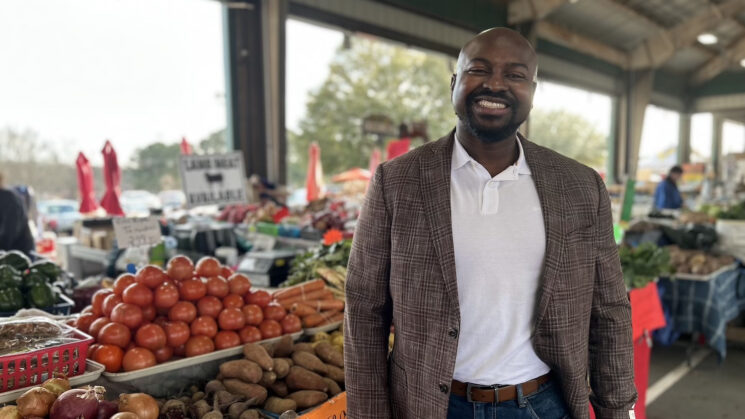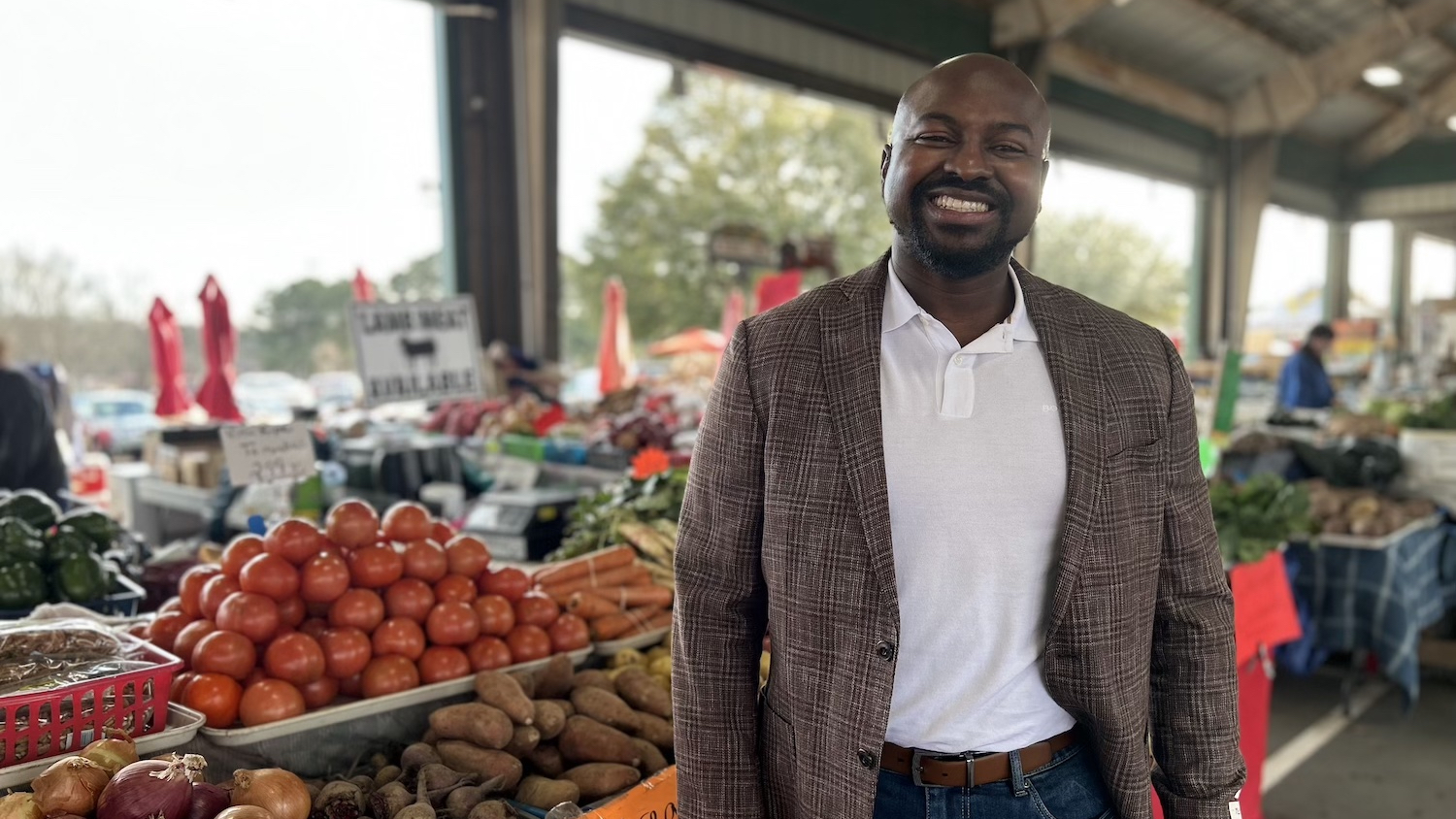
Doctoral candidate and AgBioFEWS Fellow Christopher Gillespie seeks a stronger, more racially equitable food system, and at NC State, he’s taking steps to achieve that.
February 13, 2024 | 5-min. read

While doctoral candidate (and AgBioFEWS Fellow) Christopher Gillespie was finishing up his NC State University dissertation on how environmental factors in different agricultural ecosystems influence greenhouse gas emissions, he was also crafting another, very different document – one with policy recommendations that he hopes lead to more racial equity in North Carolina’s food and agriculture systems.
Land loss, food insecurity and chronic diet-related health conditions can be the outcomes of inequities. But Gillespie, a student in the Department of Entomology and Plant Pathology, thinks there is a path forward to something better. NC State Extension, he says, can play a pivotal role in addressing these issues and, by doing so, make the state’s food and agriculture system stronger.
In his document,”Building Equity in the N.C. Food System Through Community Practice,” he highlights the equity work already being conducted by Extension and recommends that Extension establish a food system equity program that builds deeper trust, communication and partnerships with underrepresented populations.
Doing so, Gillespie says, will help Extension address a key strategic plan goal: adapting programs and services to impact both traditional and new audiences that reflect the diversity of the state’s population.
During his five years in the College of Agriculture and Life Sciences, Gillespie has built an impressive resume not just in science but in food system policy. He completed three fellowships, including one with North Carolina’s Center for Environmental Farming Systems that led him to serve on the leadership team with its affiliated Committee on Racial Equity in the Food System (C.O.R.E.).
These experiences, he says, were key to informing his policy recommendations. We sat down with Gillespie during Black History Month to hear his thoughts on his past, his future, and his recommendations.
What led you to be interested in agriculture?
My grandmother was an educator in the Champaign-Urbana area of Illinois for over 40 years. She was greatly involved with both the University of Illinois and the K-12 curriculum throughout the state. And my mother was a single mother in the Black ghetto, near the projects in a redlined district — one that had been denied financial and other services because of its racial makeup.
That was an interesting dichotomy for me, to see how I could have so much proximity to institutional knowledge from the University of Illinois, one of the nation’s top research institutions around cropping systems, and then be right up the street and have no idea how to identify a sorghum plant from a corn plant. So I was always close to food systems, but always very far from them as well.
When I was young, a guy once told me that agriculture was where the money was at, so I went to Michigan State University, the pioneer land-grant. I loved science, and I liked food, so I decided to study agronomy. From there, I went to Oklahoma State and studied soil chemistry.
How did you come to be interested in science policy?
After coming to NC State for my Ph.D., I became president of the Plant Pathology Graduate Student Association. By becoming involved in a successful effort to address a cost-of-living issue with graduate student stipends, I learned how to design, strategize, analyze and implement policy change. That experience showed me the power of science-based policy. From there, I became a policy entrepreneurship fellow with the Federation of American Scientists and was able to apply my creative mind to a federal policy landscape.
Why did you decide to write the policy memo on building equity in the N.C. food system?
In fall 2023, NC State Extension published a strategic plan that said, “We want to be able to reach out to nontraditional audiences.” The strategic plan opens the door for supporting BIPOC (Black, Indigenous and people of color) communities.
I immediately thought it would be remiss of me not to be able to see the complementarity between what they’re doing and what other organizations that are BIPOC-led are trying to do in the state. If we really want to be competitive and remain at the top of our country’s extension realm, as well as the food system realm, we need to look at how we can create value-chain coordination and relational trust between these different parties and different groups that have been separated.
That was the driving force behind this memo. It was the fact that we were all moving toward a similar goal. There’s a policy window right now for Extension and C.O.R.E. to amalgamate their efforts into something that can create institutional change across our entire food ecosystem of North Carolina.
What would you say needs to change to make the food system more equitable?
It has to be communication. It’s not just me calling you and saying, “How are you doing?” It’s targeted communication, where we’re doing programs that are designed in a certain way, whether it be circular seating, whether it be the food being served or how we’re talking to and greeting each other. … We need a place where we’re building relational trust through communication.
How do you think that C.O.R.E. and Extension can partner to promote equity?
I think a food system equity program within Extension could use C.O.R.E. to build a bridge between Extension and historically underrepresented groups by offering workshops and materials that allow Extension personnel to engage intentionally with BIPOC communities to promote community agency and empower conversations about shared goals and gaps in cultural understanding. C.O.R.E.’s trainings are culturally sensitive and allow people to come into a space and talk together about difficult issues. They are the best diversity, equity and inclusion trainings I’ve seen.
What’s next for your work in this area?
I don’t want to jinx myself, but I have opportunities being presented to me, whether they be in the private sector, furthering my work with soil microbiome and ecological approaches to building cropping systems, or in the public or nonprofit sectors. Whatever I’m doing, I want to be involved in helping create stronger food systems at the federal, state, county and local levels.